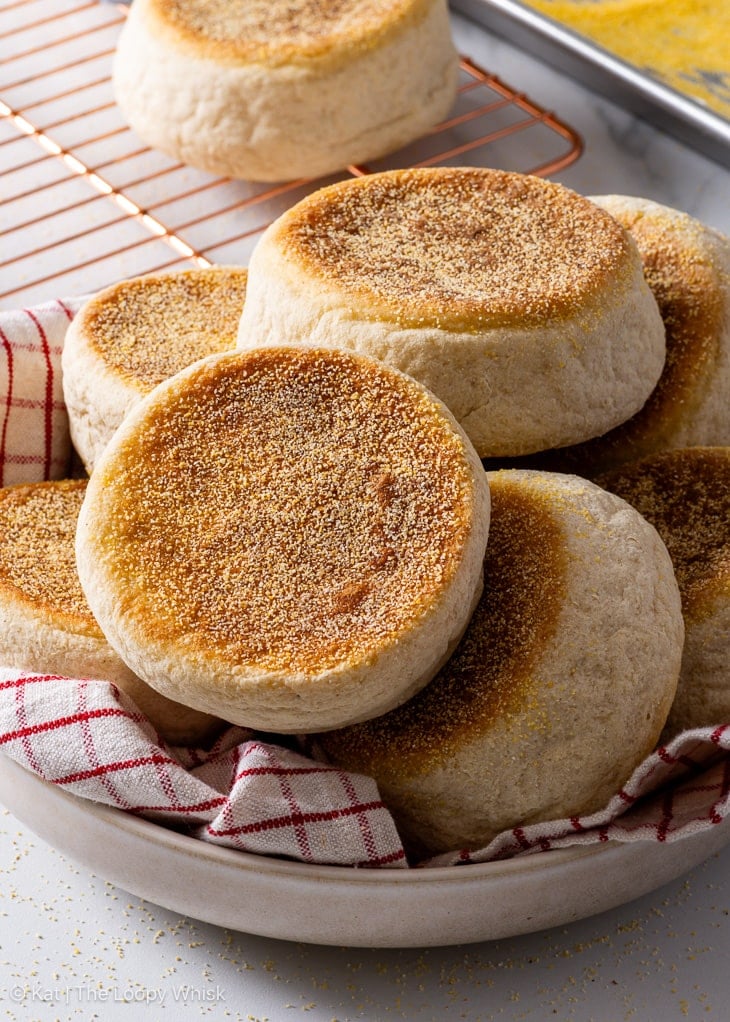These are THE BEST gluten free English muffins you’ll ever try – and they’re super easy to make!
Duration:
Ingredients
- 20 g (4 tbsp) whole/rough psyllium husk (If using psyllium husk powder, use only 17g.)
- 360 g (1½ cups) lukewarm water
- 160 g (1⅓ cups + 1 tbsp) tapioca starch (You can use an equal weight of cornstarch (US)/cornflour (UK), potato starch or arrowroot starch instead.)
- 140 g (1 cup + ½ tbsp) millet flour, plus extra for flouring the surface (You can use an equal weight of finely milled/ground brown rice flour instead.)
- 120 g (¾ cup + 3 tbsp) sorghum flour (You can use an equal weight of light buckwheat flour, white teff flour or oat flour instead. Use the latter only if you’re not sensitive to oats.)
- 25 g (2 tbsp) caster/superfine or granulated sugar
- 8 g (2½ tsp) instant yeast (If using active dry yeast, use 10g.)
- 8 g (1½ tsp) salt
- 120 g (½ cup) whole milk, lukewarm
- 20 g (1½ tbsp) sunflower oil, or other neutral-tasting oil
- 10 g (2 tsp) apple cider vinegar
- cornmeal, for dusting
Instructions
Making the dough:
-
You can prepare the dough using a stand mixer fitted with the dough hook attachment or by hand.
-
Make the psyllium gel: In a bowl, mix together the psyllium husk and lukewarm water. After about 30-45 seconds, a gel will form.
-
In a large bowl or the bowl of a stand mixer (if using), whisk together the tapioca starch, millet flour, sorghum flour, sugar, instant yeast and salt.
Tip: If using active dry yeast instead, you need to activate it first. Mix it together with the sugar and milk, and set it aside for 5-10 minutes or until the mixture starts frothing. Then, add it to the dry ingredients along with the rest of the wet ingredients.
-
Add the milk, oil and vinegar to the psyllium gel and mix well to combine.
-
Make a well in the middle of the dry ingredients and add the psyllium gel-milk mixture.
-
Knead the dough until it’s smooth and all the ingredients are evenly incorporated. Use a rubber spatula to occasionally scrape along the sides and bottom of the bowl to prevent any dry patches of unmixed flour.
The final dough should be smooth and supple, and it’ll be slightly sticky to the touch – that’s okay, you’ll be working on a lightly floured surface so it shouldn’t be a problem. Resist the temptation to add more flour to the dough, as that can make your English muffins too dense and dry.
Shaping & proofing the English muffins:
-
Sprinkle a large baking sheet evenly with cornmeal and set aside until needed.
-
Turn out the dough onto a lightly floured surface and give it a gentle knead, shaping it into a ball.
-
Divide the dough into eight equal portions, each should weigh about 125g.
-
Shape each portion into a smooth ball and place it onto the cornmeal-covered baking sheet. Press down gently on the dough ball to flatten it slightly, until it’s about 1¼-inch (3cm) thick.
-
Repeat with the rest of the dough portions, then sprinkle the tops of the English muffins with extra cornmeal.
-
Lightly cover them with a sheet of plastic wrap/cling film (to prevent them from drying out) and proof in a warm spot for about 1 hour or until doubled in size.
Tip: If your kitchen is on the cold side, put a cup of boiling hot water into your (turned-off) oven – that will create the perfect warm, slightly humid proofing environment.
Cooking the English muffins:
-
Pre-heat a large cast iron skillet, frying pan or griddle over low heat. The skillet or pan is ready when you can feel the heat when you place your hand a few inches/centimetres away from its surface. Don’t grease or butter your cooking surface.
-
Once they’ve doubled in size, use a spatula to carefully transfer the English muffins to the hot skillet or pan. (The number of English muffins you can cook at once will depend on the size of your skillet or pan, I usually cook them in two batches, 4 at once.)
-
Cook the English muffins over low heat for 11-12 minutes, until they’re deep golden brown on the bottom. Cook them uncovered – don’t cover them with a lid.
Tip: Cooking them low and slow ensures that they’re fully cooked through in the time it takes them to gain a lovely deep golden brown colour on the outside. Don’t be tempted to cook them over a higher heat or for a shorter time.
-
With the help of a spatula, carefully flip the English muffins over and cook them on the other side for a further 11-12 minutes.
-
Transfer the cooked English muffins to a wire rack and allow them to cool completely before you split, fill and serve them.
I recommend splitting them with a fork to get the maximum amount of nooks and crannies in their interior: prick the sides with the tines of fork all the way round and then pull the two halves apart.
Tip: It’s VERY important that you allow the English muffins to cool completely to room temperature before you eat them. The crumb needs time to properly cool and set, so I recommend cooling them for at least 1 hour. If you try to eat them still hot or warm, you’ll find the interior quite sticky.
Storage:
-
These gluten free English muffins are definitely at their best on the day you prepare them, but they keep well in a closed container at room temperature for 2-3 days, in which case I recommend toasting them before serving.
